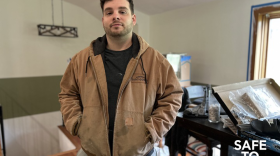Federal researchers are now recruiting for a first-of-its-kind health study on PFAS chemical exposure in drinking water at Pease International Tradeport.
Officials with the Centers for Disease Control gave an overview of what they're calling "the Pease study" in Portsmouth last night, with at least 150 residents in attendance.
Researchers aim for the study to include 1,000 adults and 350 children who drank water contaminated with PFAS while working or attending school or daycare at Pease between January 2004 and May 2014.
That's when high levels of the likely toxic chemicals were discovered in the Tradeport's Haven Well, stemming from decades of prior military use of PFAS-laden firefighting foam.
"What makes this study so important is that there's not been very many studies where we have looked at PFAS in drinking water," said Chris Reh, the associate director of the CDC's Agency for Toxic Substances and Disease Registry.
He says the Pease study will take two to three years, and will be the pilot for seven larger CDC-led studies at PFAS-contaminated sites in Michigan, Colorado, Pennsylvania, Delaware, Massachusetts, New Jersey, New York and California.
Together, those studies will collect PFAS data from thousands of people. Reh says the only other study like this was in the Ohio River Valley from 2005 to 2013, on populations exposed to chemicals from a DuPont factory.
At Pease, the CDC hopes to prioritize enrolling as many people as possible who had their blood tested by the state of New Hampshire after the contamination originally came to light.

The study is also open to any adults aged 18 and older who worked or attended school at Pease between January 2004 and May 2014, or who lived in Newington and had a PFAS-contaminated well during that period.
Children aged 4 to 17 who attended daycare at Pease, or who were born after 2005 and whose mothers meet the adult criteria, can also join.
Researchers will take blood and urine samples from participants, and get their medical and occupational histories. Scientists will study the PFAS levels in participants' blood, and compare them to earlier recorded levels if possible to see how fast the chemicals may leave the body.
They'll also look for connections to health effects that have been linked to PFAS in prior laboratory studies. The focus will be on cholesterol and other glycemic indices, as well thyroid, kidney, liver, and immune function.
"The main goal of the study is to contrast the measured PFAS levels and historically reconstructed levels … with the health outcomes that you report, and the health indicators that we measure in blood," says CDC epidemiologist Marian Pavuk. "All of those can help us better understand their associations with low, medium or higher levels of PFAS."
The study, Pavuk says, will not provide medical care or predictions of current and future health outcomes. But participants will receive their detailed medical results to share with their doctors - and officials say they'll reach out to local health care providers to better educate them about PFAS.
Many parents at last night's meeting were worried about how their kids might perceive the study. Some said they haven't yet told their young children that they were exposed to the potentially harmful chemicals at a Pease daycare years ago, worried it would confuse or scare them.
"We've shouldered the burden of this PFAS thing because we can't give our kids straight answers on it, obviously, and we don't want to alarm them," said parent Jesse Lafreniere during a question-and-answer session.
"I think our expectation is that, when we bring our children to the collection site, that there's going to be some sensitivity ... and that everyone's going to be sort of well-scripted as to what to say," he said.
He and others asked the CDC to provide a child psychologist or find other ways to account for those concerns as they set up the study.
The office visits for children ages 5 and up will include behavioral and neurological tests to gauge the chemicals' potential developmental effects. Researchers may also pull children's school records if parents report particular concerns.
Officials said they’ll try to address parents' concerns about enrolling their children before appointments begin in November.
For now, residents interested in joining or learning more about the study are encouraged to call the CDC's hotline at 1-800-CDC-INFO and answer some screening questions to determine eligibility.
The CDC also needs to enroll a control group of 100 adults and 175 children who were not exposed to drinking water at Pease.
People who have been occupationally exposed to PFAS - such as firefighters - will not be able to participate. The CDC says its occupational health branch is working toward a separate study for those populations, who may have high PFAS exposure levels independent of drinking water.








